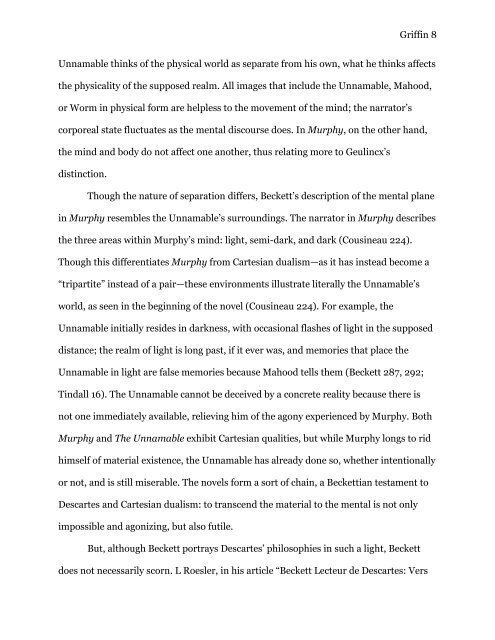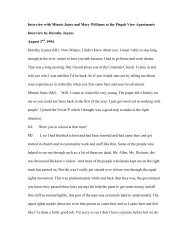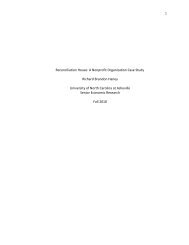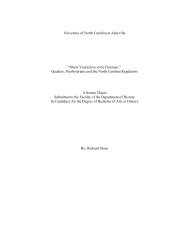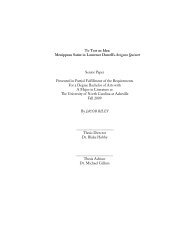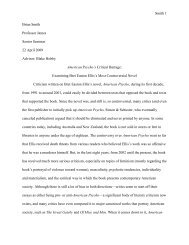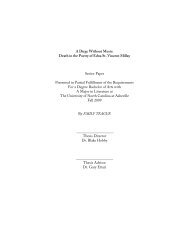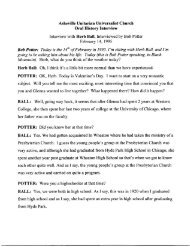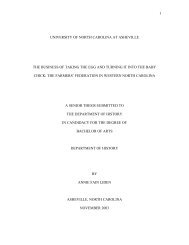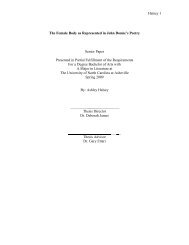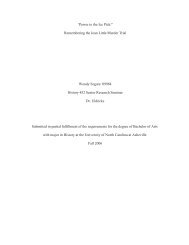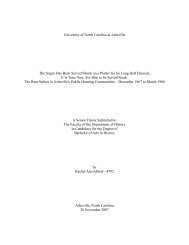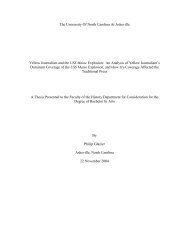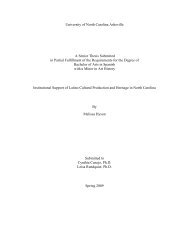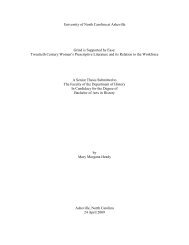Cartesian Thought in Samuel Beckett's The Unnamable
Cartesian Thought in Samuel Beckett's The Unnamable
Cartesian Thought in Samuel Beckett's The Unnamable
- No tags were found...
You also want an ePaper? Increase the reach of your titles
YUMPU automatically turns print PDFs into web optimized ePapers that Google loves.
Griff<strong>in</strong> 8<strong>Unnamable</strong> th<strong>in</strong>ks of the physical world as separate from his own, what he th<strong>in</strong>ks affectsthe physicality of the supposed realm. All images that <strong>in</strong>clude the <strong>Unnamable</strong>, Mahood,or Worm <strong>in</strong> physical form are helpless to the movement of the m<strong>in</strong>d; the narrator’scorporeal state fluctuates as the mental discourse does. In Murphy, on the other hand,the m<strong>in</strong>d and body do not affect one another, thus relat<strong>in</strong>g more to Geul<strong>in</strong>cx’sdist<strong>in</strong>ction.Though the nature of separation differs, Beckett’s description of the mental plane<strong>in</strong> Murphy resembles the <strong>Unnamable</strong>’s surround<strong>in</strong>gs. <strong>The</strong> narrator <strong>in</strong> Murphy describesthe three areas with<strong>in</strong> Murphy’s m<strong>in</strong>d: light, semi-dark, and dark (Cous<strong>in</strong>eau 224).Though this differentiates Murphy from <strong>Cartesian</strong> dualism—as it has <strong>in</strong>stead become a“tripartite” <strong>in</strong>stead of a pair—these environments illustrate literally the <strong>Unnamable</strong>’sworld, as seen <strong>in</strong> the beg<strong>in</strong>n<strong>in</strong>g of the novel (Cous<strong>in</strong>eau 224). For example, the<strong>Unnamable</strong> <strong>in</strong>itially resides <strong>in</strong> darkness, with occasional flashes of light <strong>in</strong> the supposeddistance; the realm of light is long past, if it ever was, and memories that place the<strong>Unnamable</strong> <strong>in</strong> light are false memories because Mahood tells them (Beckett 287, 292;T<strong>in</strong>dall 16). <strong>The</strong> <strong>Unnamable</strong> cannot be deceived by a concrete reality because there isnot one immediately available, reliev<strong>in</strong>g him of the agony experienced by Murphy. BothMurphy and <strong>The</strong> <strong>Unnamable</strong> exhibit <strong>Cartesian</strong> qualities, but while Murphy longs to ridhimself of material existence, the <strong>Unnamable</strong> has already done so, whether <strong>in</strong>tentionallyor not, and is still miserable. <strong>The</strong> novels form a sort of cha<strong>in</strong>, a Beckettian testament toDescartes and <strong>Cartesian</strong> dualism: to transcend the material to the mental is not onlyimpossible and agoniz<strong>in</strong>g, but also futile.But, although Beckett portrays Descartes’ philosophies <strong>in</strong> such a light, Beckettdoes not necessarily scorn. L Roesler, <strong>in</strong> his article “Beckett Lecteur de Descartes: Vers


